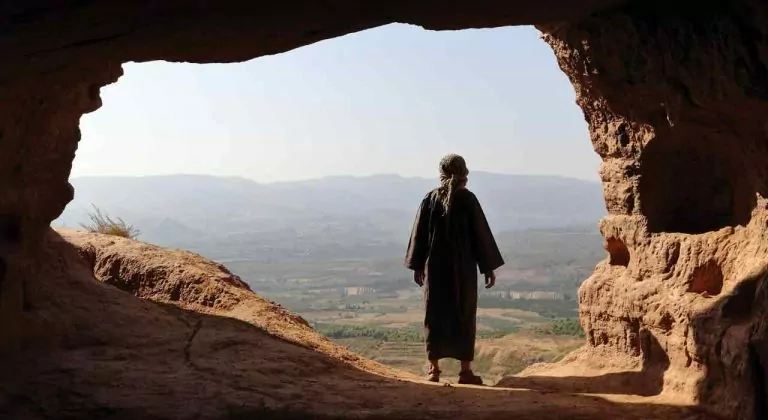“For by grace you have been saved through faith; and this is not your own doing, it is the gift of God – not because of works, lest any man should boast. For we are His workmanship, created in Christ Jesus for good works, which God prepared beforehand, that we should walk in them.” – Eph. 2:8-10
****
When he was born on January 2 in the year 300 A.D. in Alexandria, Egypt, his parents must have been filled with great thankfulness and hope, for they named their little baby boy Macarius. Macarius means “supremely blessed.” Perhaps they’d had other children die, or perhaps they had prayed for a child for a long time and were not sure that they would ever have one. Whatever the case, the bundle of blessing grew up and became a man, and that man took on the job of merchant.
There are times in the lives of believers when they consider how much they have done, how much they ought to have done and what they have not done. There is no doubt that these moments of reflection can lead to fruitfulness, to a further developing of the fruits they are admonished to have. After all, Peter encourages readers in his second epistle (1:5-7):
“…make every effort to supplement your faith with virtue, and virtue with knowledge, and knowledge with self-control, and self-control with steadfastness, and steadfastness with godliness, and godliness with brotherly affection, and brotherly affection with love.”
Across New Testament pages Peter shakes hands with Paul, who tells believers in Phil. 2:12 to work out their salvation with fear and trembling.
Retreating from the world
Macarius married, but his wife died shortly afterward. Impressed by the spectre of death which he had encountered firsthand, a spectre which was neither a respecter of youth nor of financial status, the merchant was led to forsake the world.
What did this mean for Macarius? It meant that he gave away all his material goods and moved to a solitary place where no one else lived. This place was the Thebais in Upper Egypt, a desert, a lonely area which had become a retreat for a number of Christian hermits. Macarius was convinced that this action would prepare him for eternity, that this would enable him to devote himself to thinking heavenly thoughts, that here he would be able to concentrate on pure matters.
Perhaps, however, the Thebais was not as stimulating in holiness as he speculated, for later in life he moved on to different deserts in Lybia. Hermits lived here as well, but these men were not within eyesight of one another.
Macarius became an austere man. There was a drive in him to strive for what he perceived to be perfection of character. It is not recorded whether he diligently studied the Word of God, or whether, as Peter puts it in the second part of his epistle, he experienced the grace and peace afforded those who have the knowledge of God and of Jesus Christ our Lord.
Resisting the “temptation” to serve
During the course of his stay in one of the deserts, Macarius, at one point of his life, was overcome by a virtuous desire to travel to Rome to spend time serving and aiding those who were ill in that city. It was a noble aspiration. We are told in the Bible to serve others. Indeed, Jesus commands His followers: “Love one another even as I have loved you.” (John 13:34) And did He not help the ill and the maimed? And did He not die for us?
Because Macarius often deprived himself of God-given sustenance, he was prone to strange hallucinations which he supposed were godly visions. Persuaded through some of these that to help others would make him proud and give him too much esteem in the world’s eyes, he did not leave the desert for Rome. Instead he threw himself down on the ground and cried out to the imagined “temptation,” “Drag me hence, if you can, by force, for I will not stir from here.” He lay on the ground all night.
However in the morning, upon rising, he found that his desire was still for service in Rome. Not wishing to give in, he filled two baskets with earth, lay them on his shoulders and plodded into the surrounding wilderness. Meeting someone he knew, he was questioned as to what he was doing with those baskets on his shoulders. He made no reply other than: “I am tormenting my tormentors.” Returning to his lodging in the evening, he was glad to be free of the “temptation” to serve.
It seems Macarius spent no time contemplating Jesus’ temptations in the desert – temptations which were overcome. It seems Macarius did not ponder the fulfillment of the law performed by the Lord during His life, death, resurrection and ascension. And it seems that Macarius did not think of the fact that the Holy Spirit had been sent to enable and equip believers to serve in thankfulness.
The definition of an anchorite such as Macarius, as given by Abbot Rance de la Trappe, (1626-1700 and founder of the Trappist monks), reads:
“..a soul which relishes God in solitude, and thinks no more of anything but heaven, and forgets the earth, which has nothing in it that can now please. It burns with the fire of divine love, and sighs only after God, regarding death as its greatest advantage; nevertheless it will find itself much mistaken if it imagines it shall go to God by straight paths…. in which it will have no difficulties at all…”
Sadly, such a definition describes the error of those who think they might climb into eternity using their own boots, their own merits, pushing open heaven’s door by their own victories.
A contrast
Also a January baby, my father, Louis Praamsma, was born on January 1, 1920 – one hundred and nine years ago. He was no anchorite, however, for he loved to mingle with people all of the 74 years of the life on earth which God gave him. He studied the Word of God diligently, was humble and acknowledged his sin, preaching forgiveness of sins through Jesus Christ in season and out of season, always seeking people out and giving them the reason for the hope which was in him. This is how pastors (and all believers) should be – compassionate, seeking sheep, in but not of the world, eager to listen and never too preoccupied with self. Louis Praamsma did not walk into heaven on his own merits; neither did he open heaven’s doors with his own hands when he died in 1984. No, salvation had been accomplished for him by his Savior, Jesus Christ. Hence his earthly life was full of thankful service.
Perhaps my Dad has met Macarius in heaven, if that anchorite perceived at the end of his life that all his works had been but as filthy rags.
May it be that 2019 is a year of thankfulness – one filled with love, joy, peace, patience, goodness, kindness, faithfulness, gentleness and self-control – because against such there is no law. And may our thankful lives radiate outwards towards loving one another even as Christ loves us.











